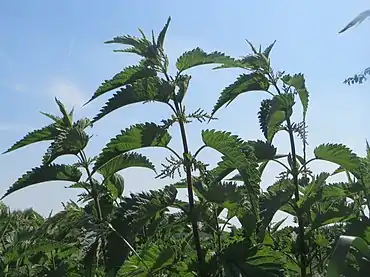Reconstruction:Proto-Slavic/kopriva
Proto-Slavic

Etymology
By surface *koprъ (“dill”) + *-ivъ + *-a, probably from the original sense steaming, scalding found in the root *kopněti (“to melt (for snow), to hope”), *kypěti (“to boil up”), because of the burning feel on the human skin on touch of this plant. For similar semantic development, compare dial. Czech žeřica (“nettle”) (from Proto-Slavic *žarъ (“embers”)), German Brennessel (“nettle”) (from German brennen (“to burn”)), Dutch brandnetel from branden (“to burn”), Latin ūrtīca from ūrere (“to burn”). Unlikely from the sense aroma applied in *koprъ and attested in the related lemmas Lithuanian kvãpas (“aroma”), Lithuanian kvėpti (“to smell, to breath”), since nettle does not have any particular smell.
A secondary reason of the relation to *koprъ (“dill”) may be the use of both as a food supplement.
The form *kropiva to which some forms point is modelled after *kropiti (“to besprinkle”) conceiving the crop’s conspicuous manner of distribution.
Alternative forms
- *kropiva
Inflection
| Singular | Dual | Plural | |
|---|---|---|---|
| Nominative | *kopriva | *koprivě | *koprivy |
| Accusative | *koprivǫ | *koprivě | *koprivy |
| Genitive | *koprivy | *koprivu | *koprivъ |
| Locative | *koprivě | *koprivu | *koprivasъ, *koprivaxъ* |
| Dative | *koprivě | *koprivama | *koprivamъ |
| Instrumental | *koprivojǫ, *koprivǫ** | *koprivama | *koprivami |
| Vocative | *koprivo | *koprivě | *koprivy |
** The second form occurs in languages that contract early across /j/ (e.g. Czech), while the first form occurs in languages that do not (e.g. Russian).
Derived terms
- *koprivьnъ (relational adjective)
Related terms
Descendants
- East Slavic:
- South Slavic:
- West Slavic:
Further reading
- Trubachyov, Oleg, editor (1984), “*kopriva”, in Этимологический словарь славянских языков [Etymological Dictionary of Slavic Languages] (in Russian), issue 11 (*konьcь – *kotьna(ja)), Moscow: Nauka, page 25
- Georgiev V. I., editor (1979), “коприва, покрива”, in Български етимологичен речник [Bulgarian Etymological Dictionary] (in Bulgarian), volume 2, Sofia: Bulgarian Academy of Sciences, page 619